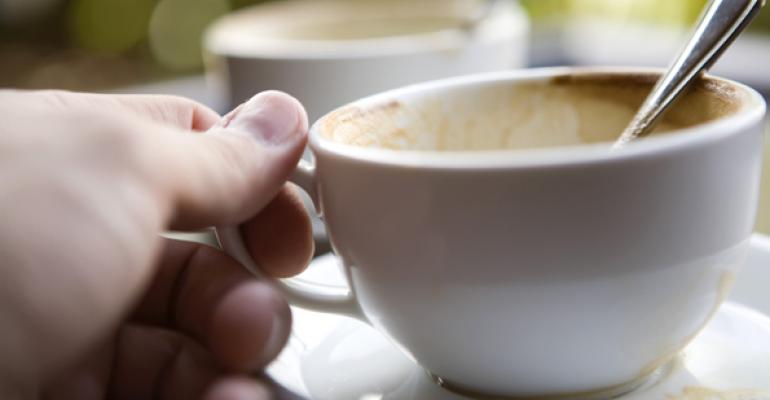Coffee tasting events are springing up nationwide as coffee enthusiasts seek ways to learn more about their favorite beverage. These coffee connoisseurs also want to associate with like-minded aficionados, so some coffee bars are responding with coffee tastings, sometimes called cuppings, which are events that are similar to wine tastings. The tasting events can help the eateries generate excitement about a new offering, develop a mailing list for marketing, and boost incremental sales. They can also get new customers to visit the establishment, and get regulars to talk more about the newest coffee.
The tasting events can help enthusiasts learn more about body, acidity, and note. The restaurant that is hosting the event might want to pick a theme for the event, such as introduction to cupping, beans from certain regions, or what’s new in single serve coffee. People want to learn about how the mouthfeel can vary among coffees, the difference between roasts, and how to pair coffees with breakfasts or desserts.
Coffee tastings share many of the same features as wine tastings. They can be sit-down, classroom style events, or they can be social get-togethers where attendees can mingle, network, and stop at different stations to taste a new coffee and discuss its complex flavors.
To get the word out about an upcoming tasting, cafes often rely on traditional communications such as signage in the store and announcements in the local newspaper. There is also social media such as announcing it on the business’s Facebook page and sending tweets on Twitter. The messaging should note that attendees will try a certain number of coffees and gain a new level of expertise. The added value is that people who are eager to know more about coffee will be able to discern not only which coffees they enjoy, but learn how to develop a refined palate for coffee.
Just as wine drinkers like to speak with sommeliers, the trained wine experts in fine dining restaurants, people who have a passion for coffee like to get information from coffee buyers, roast experts, or other masters of the subject. It’s a good idea to have a coffee expert conduct the coffee tasting, to answer questions about single serve and also about the different flavors and sources of the coffee. The coffee expert can offer personal attention if the event is limited to eight or 10 people.
Coffee tasting events can last about 90 minutes, and some cafes charge attendees. Wine aficionados are used to paying for tasting events, especially at wineries as part of a tour. The customer perceives that they were granted access to a special, limited edition wine, and they now have some inside knowledge of wine making and trends in new wines. Sometimes the participant gets to keep the wine glass, emblazoned with the winery’s logo.
For coffee tastings, cafes charge anywhere from free to $30 or more for an event, and offer online registration and payment. Some market the event as a fundraiser, while others pitch it as a way to gain expertise. Some establishments enhance the event with barista contests, showcasing workers’ talents in latte art or speed of service, for example. Others present the event as a boot camp, which implies intensive work that results in extreme expertise. Participants might feel as if they are learning tidbits about coffee that only café staff know. They might also leave with a special edition coffee cup or other merchandise, or a discount on future coffee purchases.
In addition to letting people taste the various coffees, talking about the light to dark spectrum of roasts, and explaining the benefits of single serve, coffee instructors can also let people know how to sample the coffee. Like wine tasting, coffee tasting can entail sniffing, slurping, and even spitting. They might also include activities such as having attendees write down words that come to mind when they taste the coffee, or check off words such as buttery, citrusy, or earthy. Attendees can learn about aroma, body, mouthfeel, acidity, flavor, and finish.
In the end, the attendee should feel enlightened about specific brews and single serve advantages. They might even buy coffee to go, and more importantly, they could also become loyal customers.



